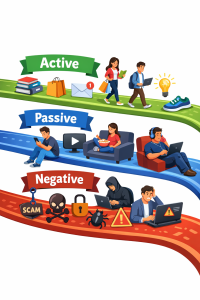Entrepreneurs are some of the most determined, driven people you’ll ever meet. The idea of slowing down feels almost criminal; there’s always another email to answer, another opportunity to chase. But the reality is that pushing yourself seven days a week isn’t just exhausting, it can be damaging to your body, brain, and business in the long run.
Here are a few examples from research:
Burnout reduces cognitive function: A 2016 study published in “Frontiers in Psychology” found that chronic work stress significantly impairs memory, attention, and emotional regulation. Translation: the longer you go without real rest, the more mistakes you make and the harder it gets to fix them.
Overwork can literally shrink your brain: Researchers at the University of Melbourne discovered that long-term occupational stress is associated with brain shrinkage, particularly in the prefrontal cortex, the area responsible for decision-making, planning, and social interaction. In other words: endless hustle can make your brain physically less capable of managing your business.
Seven-day working weeks spike your risk of heart disease: A massive review by the World Health Organization in 2021 concluded that working 55 hours or more per week increases the risk of heart disease by 17% and stroke by 35%. Entrepreneurs often top this threshold by Wednesday…
Poor recovery damages your immune system: Sleep deprivation and chronic stress have been shown in “The Lancet” to severely compromise immune function. So if you’re wondering why you’re catching every cold going round, your daily work might literally be grinding your health into the ground.
Creativity suffers without downtime: Neuroscientists have long known about the “default mode network” — the part of your brain that lights up when you’re daydreaming. It’s essential for creativity, problem-solving, and strategic insight. But if you never stop working, you starve this network of the space it needs to operate. Without rest, you don’t just lose energy, you lose imagination and that can be critical if you work in the creative sector.
Sitting too long damages your body: Extended periods of sitting, especially the way many entrepreneurs hunch over laptops, can wreak havoc on your posture, spine, and overall health. Studies published in “The Annals of Internal Medicine” show that prolonged sitting is linked to an increased risk of musculoskeletal problems, chronic back pain, and even higher mortality rates. Poor posture from constant sitting also reduces lung capacity and blood flow, making you feel more tired and foggy, not sharper. Movement isn’t just for fitness; it’s essential for keeping your body functioning optimally under pressure.
You don’t need to earn a catastrophic burnout before allowing yourself a break. It’s perfectly OK to climb into bed early because you’re tired or spend an afternoon modelling because it’s coming up to the anniversary of the loss of mates youo served with. It’s OK to spend an afternoon binge-watching “Kitchen Nightmares” because your brain needs to chew on something other than spreadsheets for once. You’re not failing your business by resting. You’re actually future-proofing it by giving yourself some head space.
If you’re in a period of a project where you have to push, that’s OK, but you can still be smart about how you do it. Here are 7 proven strategies to stay sustainable:
1. Work in focused sprints, not marathons: The brain can only concentrate deeply for about 90–120 minutes at a time (Stanford University, 2020). Set a timer, work hard, then step away for a true break, even 10 minutes helps reset your focus. If you work from home, go do the hoovering or laundry – yes it’s boring but you’re getting a task off the job list at the same time too!
2. Prioritise sleep like it’s a business strategy: Aim for 7–8 hours a night. Research from the “American Academy of Sleep Medicine” shows sleep deprivation cuts productivity by up to 30%. You don’t lose time sleeping, you gain output. And more importantly, I’m hearing quite a lot of professors speaking about the importance of allowing specialist cells in your brain to housekeep.
3. Plan real recovery days (not fake ones): Block out at least one day (worst case half a day) every fortnight where you’re genuinely off: no work calls, no “quick emails,” no “just one meeting.” Treat it like an unmissable appointment with your future self.
4. Keep your body moving: Exercise isn’t just for fitness, it actively sharpens memory, learning, and mood. Even a brisk 20-minute walk (Harvard Health, 2019) can boost your cognitive performance for hours.
5. Fuel yourself properly: Living off coffee and skipped meals backfires. Studies in the “Nutrients” journal show that erratic eating spikes cortisol (the stress hormone) and reduces mental resilience. If you’re trying to lose weight, speak to a nutritionist who is up to date (contact us for suggestions) and properly qualified (not the one who is in every network group you attend telling everyone about their latest qualification after a gruelling weekend 5 hour course).
6. Protect “thinking time”: Not every hour needs to be doing. Schedule non-negotiable time to step back, strategise, and just think without distractions. Your best breakthroughs usually happen in those spaces.
7. Stay connected to something that makes you smile: A hobby, that rugby match, catching up with friends, a side project, whatever reminds you you’re more than your business. According to the Journal “Psychological Science”, small moments like this may improve resilience and stress tolerance significantly.
Photo by Daniel Chekalov



